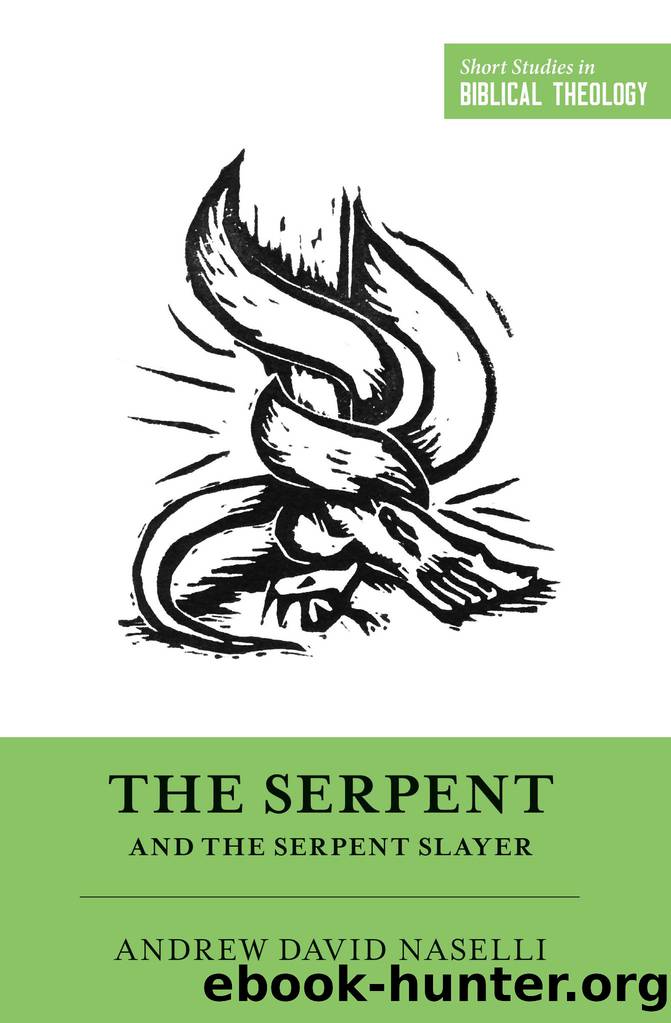The Serpent and the Serpent Slayer by Unknown

Author:Unknown
Language: eng
Format: epub
Tags: REL067000/REL074000/REL006000
Publisher: Crossway
Published: 2020-11-03T00:00:00+00:00
The Hebrew word translated âof scalesâ or âscaleâ (qasqeset) occurs seven other times in the Old Testament, and every time it refers to the scales of fishâincluding the dragon in the sea (Lev. 11:9, 10, 12; Deut. 14:9, 10; Ezek. 29:4 [2x]). God calls Pharaoh âthe great dragonâ with âscales (Ezek. 29:3â4). It is also significant that the word appears twice in Ezekiel 29:4 because 1 Samuel 17 and Ezekiel 29 parallel each other in at least three important ways.15
1. First Samuel 17:5 and Ezekiel 29:3â4 are the only two passages in the Bible that describe a person as having scales. God calls Pharaoh âthe great dragonâ with âscalesâ (Ezek. 29:3â4; see the above section âThe Lord Will Judge Egyptâ). Goliath is also covered in scalesâjust like a dragon.
2. First Samuel 17:46 and Ezekiel 29:5 use parallel phrases:
I will give the dead bodies of the host of the Philistines this day to the birds of the air and to the wild beasts of the earth. (1 Sam. 17:46)
To the beasts of the earth and to the birds of the heavens I give you as food. (Ezek. 29:5)
3. First Samuel 17:46 and Ezekiel 29:6 parallel each other:
. . . that all the earth may know that there is a God in Israel. (1 Sam. 17:46)
Then all the inhabitants of Egypt shall know that I am the Lord. (Ezek. 29:6)
The theological message of the David and Goliath story is that âthe battle is the Lordâsâ (1 Sam. 17:47). God slays dragons. Once again the seed of the woman crushes the seed of the serpent.
It is surely no coincidence that when the seed of the woman named David lets fly his stone, the uncircumcised Philistine seed of the serpent who defied the armies of the living God gets struck [nakhah] on the forehead [metsah]. The stone sinks into his forehead [wattitba haeven bemitsho], and with a crushed head the Philistine falls dead (1 Sam 17:49). The collective seed of the woman are delivered from the seed of the serpent by the judgment administered through the singular seed of the woman.16
The King of Babylon: A Sea Monster
God would use Babylon to judge his rebellious people in Judah. This does not mean that Babylon would be innocent or exempt from punishment; it simply means that God ordained Babylon to accomplish his plan (cf. Jer. 27:1â15; the book of Habakkuk).17 God describes Babylon as a sea monster and as poisonous serpents and adders, and he anticipates that his people in Judah will lament:
âNebuchadnezzar the king of Babylon has devoured me;
he has crushed me;
he has made me an empty vessel;
he has swallowed me like a monster;
he has filled his stomach with my delicacies;
he has rinsed me out.
The violence done to me and to my kinsmen be upon Babylon,â
let the inhabitant of Zion say.
âMy blood be upon the inhabitants of Chaldea,â
let Jerusalem say. (Jer. 51:34â35)
God pronounces that he has ordained Babylon to serve as the instrument through which he judges his people:
âThe snorting of their [i.e., Babylonâs] horses is heard from Dan;
at the sound of the neighing of their stallions
the whole land quakes.
Download
This site does not store any files on its server. We only index and link to content provided by other sites. Please contact the content providers to delete copyright contents if any and email us, we'll remove relevant links or contents immediately.
Joan of Arc by Mary Gordon(4090)
Victory over the Darkness by Neil T. Anderson(2850)
The Gnostic Gospels by Pagels Elaine(2516)
Devil, The by Almond Philip C(2323)
The Nativity by Geza Vermes(2221)
The Psychedelic Gospels: The Secret History of Hallucinogens in Christianity by Jerry B. Brown(2148)
Going Clear: Scientology, Hollywood, and the Prison of Belief by Lawrence Wright(1973)
Going Clear by Lawrence Wright(1958)
A TIME TO KEEP SILENCE by Patrick Leigh Fermor(1895)
Barking to the Choir by Gregory Boyle(1817)
Old Testament History by John H. Sailhamer(1803)
Augustine: Conversions to Confessions by Robin Lane Fox(1764)
A Prophet with Honor by William C. Martin(1715)
A History of the Franks by Gregory of Tours(1711)
The Bible Doesn't Say That by Dr. Joel M. Hoffman(1675)
The Knights Templar by Sean Martin(1649)
by Christianity & Islam(1627)
The Source by James A. Michener(1598)
The Amish by Steven M. Nolt(1560)
